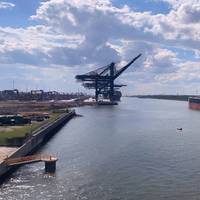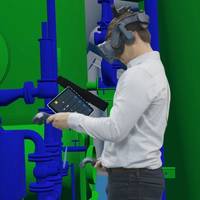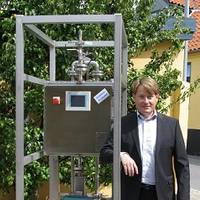Bunker Fuel Contamination Hits US Gulf Coast

Contaminated marine fuels from several suppliers led to fouled engines on about a dozen vessels operating from the U.S. Gulf Coast this spring, according to Lloyd's Register and marine fuel testing service VPS.The tainted fuel was the first major occurrence along the U.S.
Kinemagic's Stratus Speeds Up Digital Twin Creation

Tech company Kinemagic, focused on developing augmented reality solutions for heavy industrial companies, has recently launched Stratus, a 3D VR/XR software solution that the company promises will shake up the digital twin industry. Stratus is an automated software program designed to save users’ time and money by identifying more design flaws before construction begins.According to Kinemagic, Stratus reveals the future of industrial design through VR ‘walkthroughs’ from the command center of the operator’s desk.
VPS Raises Concerns Over Revised Rules for Fuels
Veritas Petroleum Services (VPS) expressed reservations about some of the proposed revisions to the international ISO 8217 specifications of marine fuels. Areas of significance include proposed changes that may be unfavourable to ship owners and operators. Clause 5.3 of the current ISO 8217:2012, the fifth version, states that “fuels shall be free from any material that renders the fuel unacceptable for use in marine applications”. There is also explicit mention in Clause 5.5 that “The fuel shall not contain any additive at the concentration used in the fuel, or any added substance or chemical waste that jeopardizes the safety of the ship or adversely affects the performance of the machinery, or is harmful to personnel, or contributes overall to additional air pollution”.
Keppel Launches Greenfield Data Centre
Keppel Telecommunications & Transportation Ltd (Keppel T&T) officially opened its Almere Data Centre 2 today, its first greenfield data centre in Europe*. The opening of the facility was attended by Guest-of-Honour Prof. Dr. Jan Peter Balkenende, former Prime Minister of the Netherlands and Partner, Corporate Responsibility at EY. Also in attendance were Mr John Neary, Ambassador of Ireland to the Netherlands, Mr Ethan Chua, Deputy Chief of Mission & Counsellor, Embassy of the Republic of Singapore, Mr Mark Pol, Vice Mayor of the City of Almere for Finance, Economic Affairs and Municipal Real Estate and Mr Alexander Van Der Hooft, EVP Operations Business Market at KPN.
S3 Smart Sulphur Switch

The S3 system distinguishes itself through its ability to always blend and adjust two fuels to the desired sulphur content as well as documenting sulphur content, enabling monitoring and control of sulphur emissions. The primary market for the S3 Smart Sulphur Switch is for vessels that occasionally need to enter an ECA meaning that the investment in a scrubber solution is not viable. The secondary market is for vessels, for example ferry operators in the Baltic who choose to install scrubbers that cannot handle more than 2% sulphur content due to space considerations.
Warnings of Off Spec Fuel Deliveries at Riga
Fuel testing agency Lintec Testing Services has warned that three fuel oil samples taken recently from vessels that have bunkered in Riga, Latvia, have shown the presence of Dicyclopentadiene (DCPD), a synthetic substance not naturally occurring within marine fuel. Lintec Managing Director Geoff Jones said, “The presence of DCPD was detected by Lintec’s chemical screening service. This fuel is clearly in breach of Section 5.1 of the ISO-8217 specification, which clearly states that ‘the fuels should be homogeneous blends of hydrocarbons derived from petroleum refining. This shall not preclude the incorporation of small amounts of additives intended to improve some aspects of performance. The fuels shall be free from inorganic acids and from used lubricating oils.
Lintec Warns on Chemical Contamination
of ships' crews and the operation of vessels. styrene monomer is a chemical commodity. plants. Lintec considers to be acceptable. managing director John Dixon. ppm range. over 20% having more than 100 ppm styrene concentration. the source of the problem. Dixon. fuel. Secondly, there is the health and safety issue. knowingly puts their crews at risk from inhaling chemical vapours. will damage the engine. under some circumstances it can polymerise and cause fuel filter clogging. needs to be controlled. because it poses a significant health risk. launched as an add-on service to normal fuel testing last year. layer of forensic protection on a routine basis, at very small cost. edge. launched this thinking about engine damage," says Dixon.
Oil Spill Response: Alstom Has Innovative Spill Clean Up Concept
At press time, the news of the oil refinery explosion in MR/EN's neighboring borough of Staten Island, NY has rocked not only New York City and its environs, but once again proven the tenuous hold that is sometimes had in the process of delivering petroleum products by ship and barge. Piecing together scattered first-hand and wire reports, it is alleged that the cause of the explosion was a barge belonging to Hicksville, N.Y.-based Bouchard Transportation Co. that exploded while workers were offloading 100,000 barrels of unleaded gasoline off the Bouchard B#125 barge at the ExxonMobil Port Mobil Terminal in Staten Island. Killed in the blast were two longtime Bouchard employees…
Oil Tankers Get A Bad Rap, Say Experts
Oil tankers get a lot of bad press, but shipping causes only a small amount of marine pollution, maritime experts said. "Shipping is less polluting than most other transport modes. It is responsible for only some 12 percent of marine pollution," Mats Lindau, quality manager of marine insurer the Swedish Club said. Although land sources from polluted rivers are the cause of most pollution, he said, public perceptions of shipping remain negative. Tim Wilkins, a marine biologist at tanker owners organization Intertanko, said 62 percent of oil pollution at sea came from industrial waste. About three percent resulted from tanker accidents, while another seven percent was caused by loading and other operations.
Royal Caribbean Commits To Environmental Endeavors
Today's era of stringent environmental policy marvelates that cruise lines must work to achieve good environmental practice. The marine industry in general, the cruise market in particular, have continually worked to project the image of environmental friend. However through high profile cases of negligence and/or abuse, significant new layers of rules and regulations are entering force to ensure shipping companies are truly committed to protecting the valuable environment within which they operation. Royal Caribbean (RCCL) — following a year in which it was levied record fines of $18 million for its poor environmental practices — has since established a compliance program called Above and Beyond Compliance (ABC) — in addition to its environmentally-sound Save The Waves Program.







